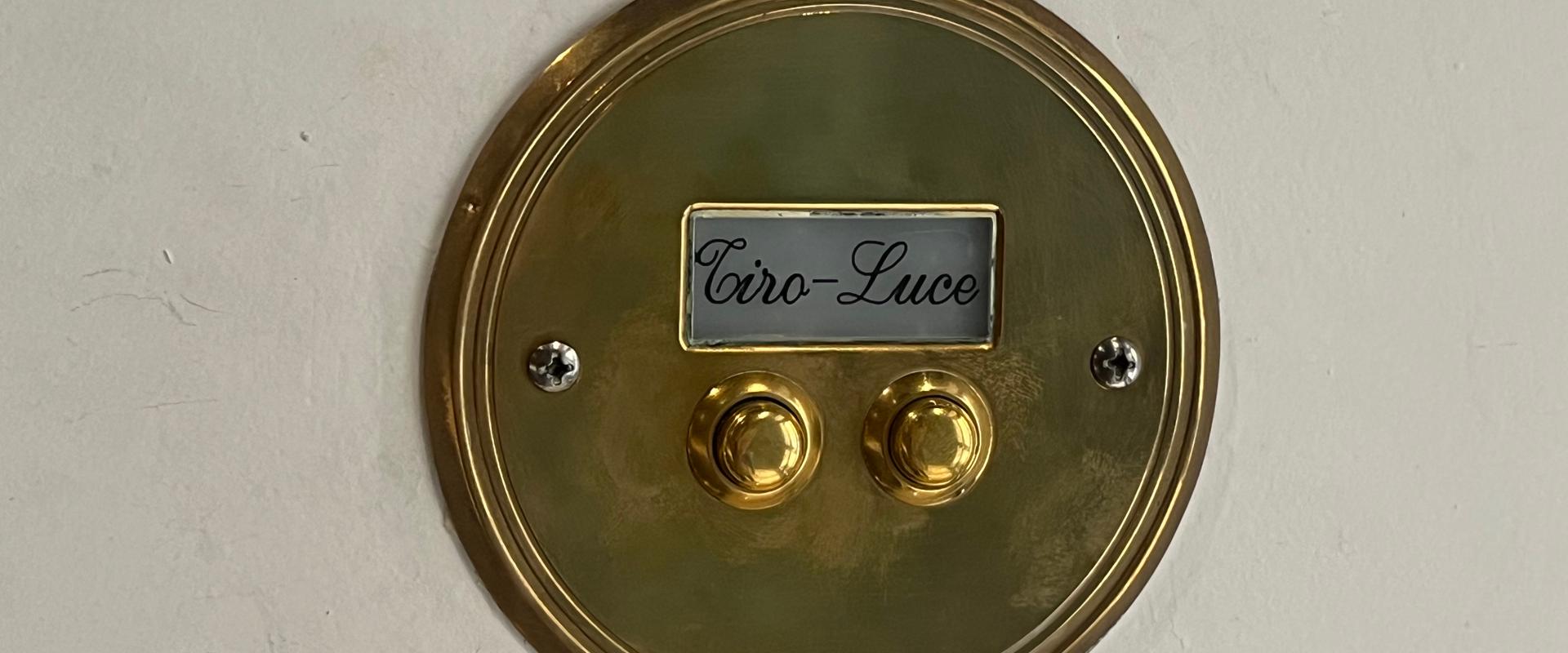THE IDIOMS AND THE DIALECT IN BOLOGNA
As in every city, the language is the mirror of history and tradition, and Bologna has not only its traditional dialect but also some words that are now included in the daily vocabulary of the citizens.
If you come to Bologna, you will certainly be impressed by a specific word that is often written near the entrance doors of the houses. I am talking about the word “tiro”, (which is usually next to the word “luce”). No one who is not from Bologna knows about this term, because it was born right here in this city, and it has been kept within its walls. It is a word that dates back to the 18th century and that simply specifies the door opening command. However, thanks to the position of our boutique hotel in the centre of Bologna , by walking through the main streets, a careful and curious eye can catch some little plates with the two commands “tiro” and “luce”, like the one in the picture.
AN IDIOM OF ‘800
At the time, the doors of Bologna houses were opened through a mechanical system consisting of ropes and chains. In particular, the hosts who arrived in front of the gate could warn of their presence by pressing the doorknob, which made a little bell ring inside the building, since the knob and the bell were connected by a rope. Therefore, those who were inside the house could open the door remotely, by dropping the lock and pulling strongly the chain, which was hooked to the gate. Since then, the expression “dare il tiro” has become in all respects a synonym of door opening. As it is a widespread idiom, despite the electric energy that arrived in Bologna, this expression has been kept to refer to door opening as well. And it’s not over yet! Still today, in the houses’ entrance halls of Bologna, there is a button with the word “tiro” and people have kept the custom of saying “mi dai il tiro” to ask for the door opening. Thus, this idiom shows how the city of Bologna has a very strong history and tradition, in which all the citizens still identify themselves and you will be able to discover it by staying at our Art Hotel Commercianti.
THE DIALECT OF BOLOGNA:
As I said before, in Bologna, the dialect is still strongly rooted, and some words have become so usual in speaking that it is hard to define the threshold between the dialect and the Italian language. Below, I will give some examples of the most common words in the dialect of Bologna.
1) rusco: it is a word used to refer to rubbish, but its origin is very ancient. In fact, “il rusco”, or in the dialect of Bologna “rossc” represents a bushy plant commonly known as butcher’s broom, which in ancient times was used to make brooms and other tools for cleaning the house. Outside the old houses, it was usual to have this type of plant because they kept mice distant, which were animals carrying diseases and predators of food. Since at that time, the trash was composed of organic and food waste, it was thrown under the plant of “rusco”, with the function of a fertilizer. So, the meaning of this term indicating the rubbish comes from here.
2) L’umarell: it refers to a retired person, so a quite old man, who tries to find a way to spend his days. Literally it means “omarello” or “omarino”, that is a short man. This word has been popular since 2005, when the blog “Umarells” by Danilo Masotti was written. If we pay attention, we can see the so called “umarell” everywhere. For example, we can see him while he browses near a crossroad, where a car accident has just occurred, or also on a bus with plenty of people arguing with someone, even if he has only been pushed. As you might have understood, “l’umarell” is a very curious person, who likes watching, keeping his hands carefully crossed behind his back. You should not criticize this personality, because actually “l’umarell” is inside all of us and he only waits for the right moment and age to come out and show himself.
3) l’azdora: with this term, we refer to a lady who is a bit fat, has a round face, and is about to knead the Bolognese dough. She is a symbol of endless and tireless activity, and she represents the fulcrum of the family in Bologna. Mainly in farmers’ families, the members divided their roles to support the family. There was the so called “azdor”, who was the ruler and the householder, he dealt with the home affairs and everything about money. Then, there was “l’azdora”, who was the woman ruler and usually the householder’s wife. She dealt with the housework, such as taking care of the home, preparing meals, and going to the market to swap products (like poultry, cheese and eggs) with other goods useful for the family, like salt and oil. Still today “l’azdora”, in addition to being a hero for all the citizens of Bologna, represents a real institution.
A WEEKEND IN THE ATMOSPHERE OF BOLOGNA
Therefore, if you have planned a weekend in Bologna, we will be glad to host you in our Art Hotel Commercianti and our apartments in the city center, and you will have the opportunity to hear first-hand all idioms and the dialect spoken by the authentic inhabitants of Bologna. It is a great privilege that will allow you to get fully into the atmosphere of this city and enrich your cultural and linguistic background, too.
We are waiting for you!


